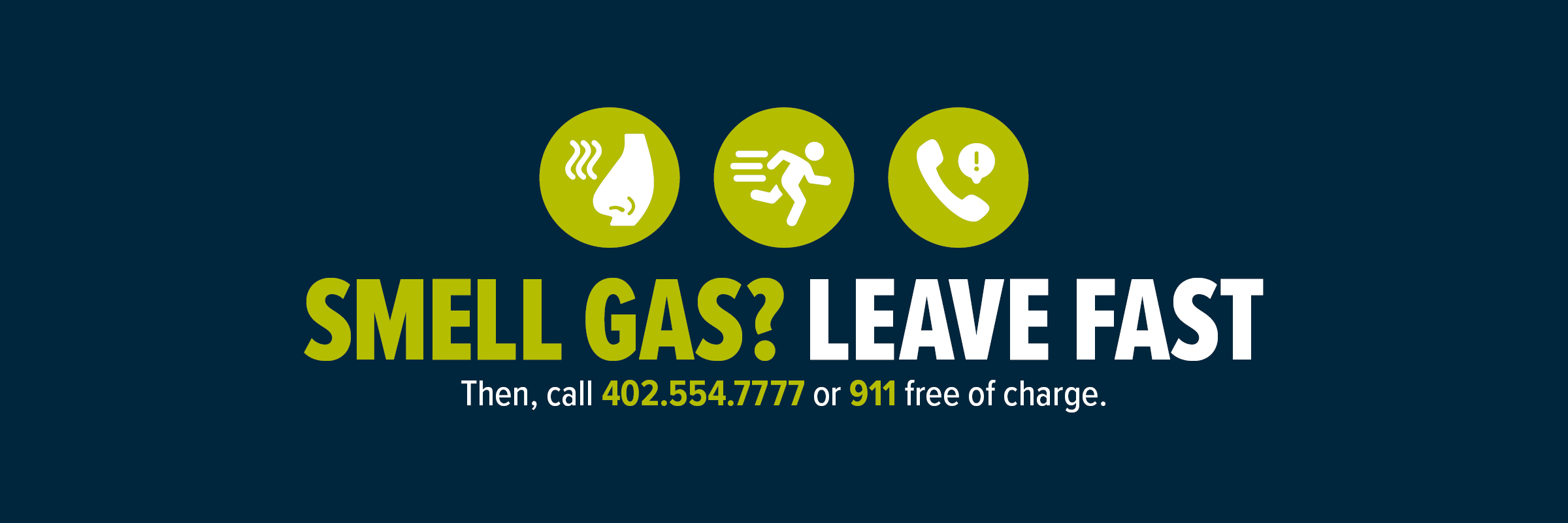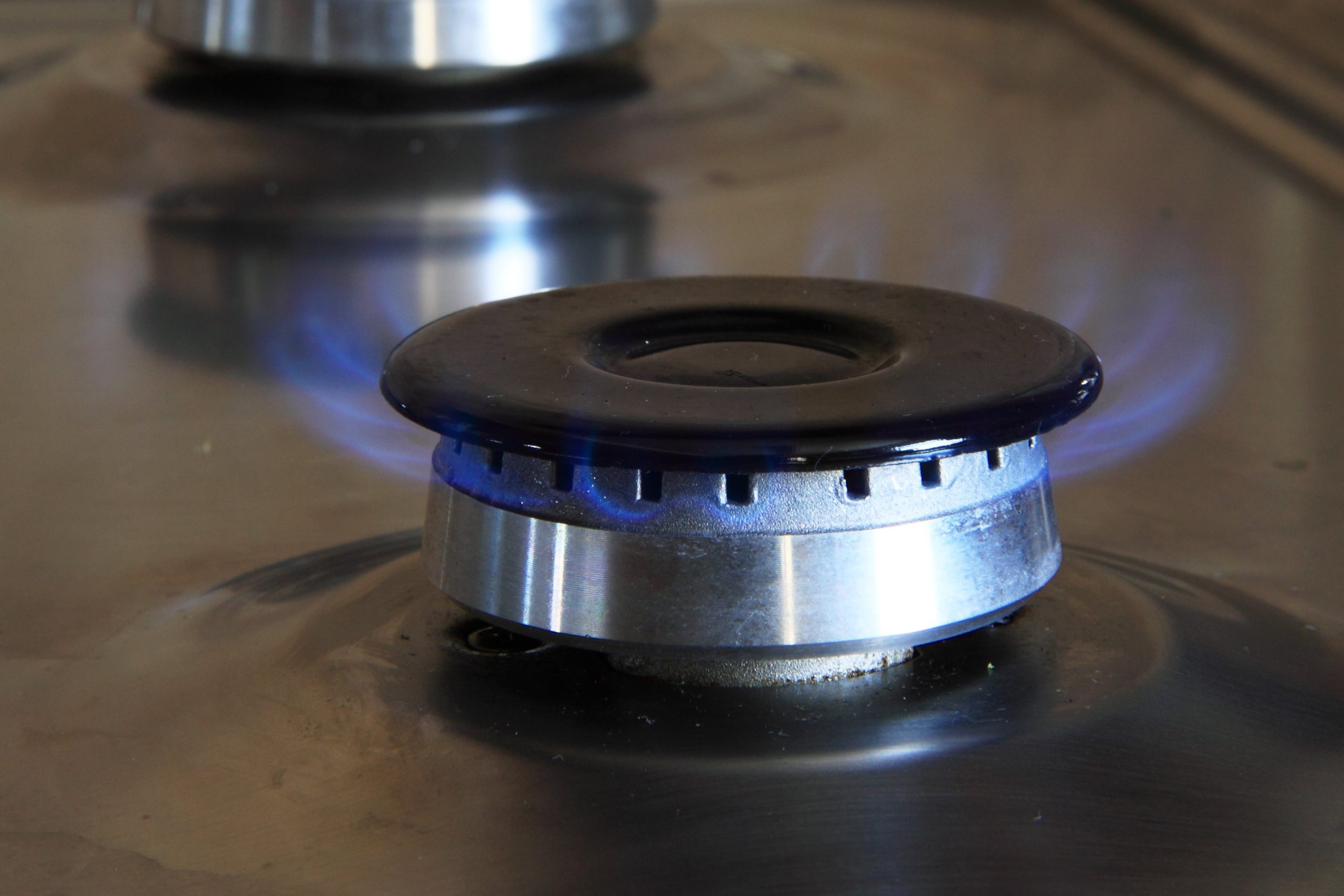WHAT IS AN EMERGENCY?
Gas leaks, odor of gas, damaged lines, carbon monoxide symptoms and water main breaks are all considered emergencies.
If you smell gas, do not attempt to locate the leak. Instead, leave the house or building right away. Do not use any electrical switches, appliances, lights, telephones, or mobile devices, as an electrical charge could create a spark. When you are in a safe place, call M.U.D.'s emergency hotline at 402.554.7777 or 9-1-1.
If someone is showing symptoms of carbon monoxide poisoning, call 9-1-1 immediately. Symptoms are like the flu.
If you have a water-related emergency, call 402.554.7777. Our personnel are ready to assist you 24/7. When in doubt, call us immediately.
Learn More¿QUÉ ES UNA EMERGENCIA?
Las fugas de gas, el olor a gas, las tuberías de gas dañadas, los síntomas de monóxido de carbono y roturas en las tuberías principales de agua son consideradas emergencias.
Si huele a gas, NO trate de localizar la fuga/escape. Al contrario, abandone la casa o el edificio inmediatamente. No utilice los interruptores eléctricos, electrodomésticos, luces, teléfonos o equipos móviles, ya que una carga eléctrica podría provocar una chispa. Una vez que se encuentre en un lugar seguro, entonces llame a la línea directa de emergencia de M.U.D. al 402.554.7777 o al 9-1-1.
Si alguien tiene síntomas de envenenamiento causados por el monóxido de carbono, llame al 9-1-1 inmediatamente. Los síntomas son como los de la gripe/catarro.
Si tiene una emergencia relacionada con el agua, llame al 402.554.7777. Nuestro personal está listo para ayudarle, 24/7. Cuando dude o crea que hay una emergencia, llámenos de inmediato.
Aprende Más
How to Recognize a Gas Leak
-
SMELL
Recognize the odor which is similar to a skunk, rotten eggs or sulfur.
-
SIGHT
Look for a white cloud, mist, fog, bubbles in standing water or blowing dust. You may also see dead vegetation spots in the grass.
-
SOUND
Listen for an unusual noise like roaring, hissing or whistling.
If You Suspect a Gas Leak:
- Move to a safe environment away from the building.
- Do not use a land line phone or cell phone inside the building.
- Do not use anything that could produce a spark, ignite the gas and/or cause an explosion. (This means, do not touch/operate light switches, garage doors/openers, matches, candles, lighters, flashlights, motors or appliances).
- Do not assume someone else will report the condition.
- Once you are out of the building/area, call 402.554.7777 or 911 and provide your location.
- Let us know if construction or digging activities are going on in the area.
- There is no charge for checking gas leaks.

Natural Gas and its Hazards
Natural gas is an economical, safe, colorless and odorless fuel. For easy detection, we add a chemical to give gas a distinctive odor like skunk, rotten eggs or sulfur. Natural gas is not poisonous, however it can displace oxygen in a room. Since it is lighter than air, natural gas dissipates quicker than propane or gasoline. While natural gas has a better safety record than any other major form of energy, its use requires caution.
Potential hazards include fire, explosion or suffocation, however natural gas alone will not burn or explode. It needs the right amount of air and an ignition source. More than half of the reported natural gas accidents are caused by people digging before utility lines are marked. Call 811 two business days before digging.
Tips to Prepare for Heating Season
- Have natural gas appliances, heating system, chimney and venting systems inspected every year by a qualified heating contractor.
- Gas appliances and furnaces need fresh air for proper combustion. Combustion products need to be vented to the outdoors. Keep flues, ducts and vents attached to appliances and heating systems in good condition and clear of obstructions.
- Use a clean filter. Standard furnace filters need to be cleaned or changed more often in winter. Check the owner’s manual for frequency.
- Clean warm-air registers and make sure they are not blocked by furniture, carpet or drapes.
- Seal leaks around doors, windows and other openings ensuring they have plenty of insulation in walls and the attic.
- Do not use gas ovens to heat a room or for any purpose other than cooking. It could be dangerous to your safety and may damage the range or oven.
- Each gas appliance has its own shut-off valve. Know where each is located and how to shut it off in case of a suspected gas leak.
- Teach children about safety around all household appliances.
To download a natural gas safety brochure, please click here.
Electrical power outages and natural gas supplies/appliances
Loss of electrical power to your home does not impact the gas supply to your home or appliances (Note: Gas stoves that are spark ignition will not work without power). Once the power is restored to your home, the power to your appliances may need to be cycled to reset them.
Please contact your HVAC service provider to assist you if your furnace or water heater do not start back up once power is restored.
Before you dig in your yard, call Nebraska 811 or 800.331.5666
Call at least two working days in advance, and ask for a “locate.” Utility representatives will locate and mark all underground (gas, water, electric, phone, cable) lines. There is no charge for the service.
You can send an online request through the Nebraska 811 website at ne1call.com.
If you damage any underground facilities during your excavation and smell natural gas, first leave the area and then call 911. Then call M.U.D. at 402.554.7777, followed by 811 to report the damages. If water lines are damaged, call a licensed plumber.
Before digging projects, call Nebraska811 or 800.331.5666
Call at least two working days in advance, and ask for a “locate.” Utility representatives will locate and mark all underground (gas, water, electric, phone, cable) lines. There is no charge for the service. You can also submit your request online.
If gas lines are damaged while digging, leave the immediate area and call 911. Then call M.U.D. at 402.554.7777, followed by 811 to report the damage. If water lines are damaged, call a licensed plumber.
Disasters
In the event of a disaster, turn off all gas appliances as you would if you were leaving your home — like the stove, oven, gas fireplace, etc. If there is a situation where gas needs to be shut off, M.U.D. will take care of it, and keep customers informed via the news media. An uncontrolled release of natural gas may result in fire, explosion or suffocation.
Decreased sense of smell
If you have a decreased sense of smell, you may want to buy a “natural gas sensor.” Most models are available for less than $60. They are easy to install and they monitor carbon monoxide, methane (natural gas) and propane. The unit should have the UL (Underwriters Laboratory) seal of approval.
Meter snow removal
From: U.S. Department of Transportation
Subject: Abnormal Snow and Ice Build-up on Gas Distribution Systems
- Clear snow and ice from exhaust and combustion air vents for gas appliances to prevent accumulation of carbon monoxide in buildings or operational problems for the combustion equipment.
- Pay attention to snow and ice related situations that may cause operational problems for pressure control and other equipment.
- Monitor the accumulation of moisture in equipment and snow or ice blocking regulator or relief valve vents which could prevent regulators and relief valves from functioning properly.
- Piping on service regulator sets is susceptible to damage that could result in failure if caution is not exercised in cleaning snow from around the equipment. Where possible, use a broom, instead of a shovel to clear snow off regulators, meters, associated piping, tubing, gauges or other system appurtenances.
- Contact the gas company or designated emergency response officials if there is an odor of gas present or if gas appliances are not functioning properly. If there is a gas odor, occupants should leave the residence immediately and contact their gas company or 911.
Backdraft
To conserve energy and reduce heating costs, many of us have turned to wood burning fireplaces and stoves to supplement the heat we receive from our natural gas furnaces.
However, some homes often are too tight to provide adequate air for the safe operation of open-flame heating systems (fireplaces, wood, oil, propane stoves, natural gas furnaces).
After you weatherize your home, you may need to add a combustion air source to prevent backdrafting. Consult with a qualified heating contractor.
What is back drafting?
Fireplaces require lots of air. If there isn’t enough air to satisfy the requirements of a fireplace or wood stove as well as a furnace or water heater all burning at the same time, the fireplace draft can pull harmful combustion products, such as carbon monoxide, from gas appliances back into the room.
The products of combustion must be continuously removed while the fireplace or stove is operating. In fact, any device that removes air from the home can contribute to backdrafting problems, including:
- Kitchen and bathroom exhaust fans
- Electric and gas clothes dryers
- Furnaces
- Water heaters
- To check for back drafting
Start a fire in the fireplace on a cold day and after a few minutes, touch the vent pipe of the furnace, water heater or any space heater. Use caution, the vent may be very hot.
However, if the vent is cold, your fireplace may be creating a dangerous back draft.
Turn down the thermostat and water heater controls. Let the fireplace burn down (if you have glass doors on the fireplace, close them), and call a heating contractor.
Carbon monoxide
For information on carbon monoxide awareness and prevention visit this page.
Gas appliance safety recalls
Frequently Asked Utilities Safety Questions
-
Are cross bores a safety hazard?
Cross bores are not an immediate safety hazard. The normal waste water passing through a sewer lateral will not harm a gas pipe. Depending on the location of the cross bore, it may cause a sewer lateral blockage over time. Cross bores can become dangerous if someone attempts to clear the blockage using mechanical cleaning equipment such as augers that can cause the gas pipe to become severed causing natural gas to leak from the pipe and can lead to a deadly explosion.
A sewer lateral is generally installed in a downward slope from a home to the street. Because natural gas is lighter than air, it will go up when released to the atmosphere. If a natural gas pipe is severed inside a sewer lateral, the gas will try to rise which means it travels towards the home rather than into the mainline sanitary sewer.
-
Are cross bores just associated with the natural gas industry?
No, this is a problem that occurs with any company that installs its utility using directional boring. Many utilities including natural gas, power (electricity), telecommunications, and fiber optics are installed throughout the Omaha area and the rest of the nation using directional boring.
-
How frequently do cross bores occur?
Nationally, it is estimated there are two to three cross bores per mile of installed gas pipe. Based on the inspections performed over the past year, M.U.D. has seen quantities similar to the national average in Omaha.
-
What is M.U.D. doing about cross bores?
At the beginning of 2011, M.U.D. began inspecting the sewer laterals of all properties in an area where we installed gas pipes using directional boring. M.U.D. construction crews are also placing pink warning tags on the front doors of all homes in areas where direction boring installations are being done. We also compiled a list of all the areas where we installed gas pipes using directional boring in the past. We are in the process of inspecting these areas as well; however it will take several years to complete all of the necessary inspections.






